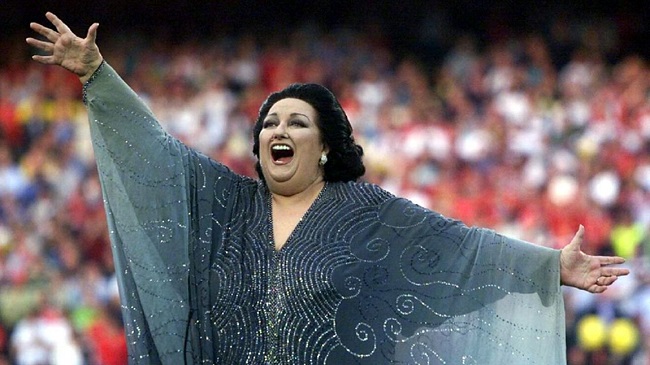La Superba, the Spanish opera singer Montserrat Caballe, was born on this day in 1928. Both her unusual bel canto vocal technique and her work with Freddie Mercury to bring opera to the pop charts were sources of great acclaim during her career.
She was lauded as “the great woman of opera, legend of world culture, the best there is” by King Felipe VI of Spain. Google’s logo was updated in six countries in her honour. Here’s how her tale goes:
Who was Montserrat Caballé?
Montserrat Caballé, born Maria de Montserrat Viviana Concepción Caballé i Folch, was a renowned Spanish operatic soprano. Born on April 12, 1933, in Barcelona, Spain, she rose to international fame in the mid-20th century, known for her bel canto technique, wide-ranging voice, and her interpretations of the works of Rossini, Bellini, and Donizetti.

Montserrat Caballe Early Life and Career Beginnings
Caballé’s interest in music began at an early age, and she received her initial musical training at the Liceu Conservatory in her native Barcelona. Her early career was marked by performances in various opera houses in Europe, where she showcased her exceptional talent and began to build her reputation.
Read Also:
- Seraph of the End Season 3 Release Date
- Secrets of Sulphur Springs Season 2 Release Date
- Outer Range Throws Josh Brolin Into a Trippy Western That
Montserrat Caballe Rise to International Fame
Montserrat Caballé’s international breakthrough came in 1965 when she substituted for an ailing Marilyn Horne in a concert performance of Donizetti’s “Lucrezia Borgia” at Carnegie Hall in New York. Her performance was met with critical acclaim, and this marked the beginning of her rise to international stardom.
Montserrat Caballe Notable Performances and Roles
Throughout her career, Caballé performed in leading opera houses around the world, including the Metropolitan Opera, La Scala, and the Royal Opera House. She was admired for her portrayals of characters such as Norma, Tosca, and Violetta. Her repertoire was vast, encompassing both classical and romantic roles.
War in Spain and the Great Depression
A native of Barcelona, Maria de Montserrat Viviana Concepcion Caballe entered the world on April 12, 1933. The Great Depression and the Spanish Civil War cost her once-middle-class family dearly.
“[My] parents were always happy and hopeful despite the civil war and the tough post-war time when you never knew where the next crust of bread was coming from,” Caballe later told Serafin Garcia Ibanez in the UNESCO Courier.
They were also avid listeners of classical music. Young Caballe’s musical talent was encouraged by his parents, Carles Caballe I Borras and Anna Folch, who exposed him frequently to their opera collection. Caballe’s parents got her into the Conservatorio del Liceo when she was 13 years old.
She learned the art of breathing exercises from Eugenia Kemeny. The opera singer later credited her training with helping her keep her voice in top shape during her lengthy career. Eventually delving into Spanish song literature, Caballe studied under the conservatory’s artistic director, Napoleone Annovazzi.
After finishing college at age 20, she moved to Italy to try out for opera roles.
Proficiency by Nature
Because she was unsuccessful in Italy, she decided to give Switzerland her full attention. She landed a role with the Basel Opera and went on to act around Europe in the late 1950s and early 1960s, covering the parts of more than 40 roles.
Bernabe Marti, a Spanish tenor, was the lucky man who won the singer’s heart in 1964. Montserrat Marti and Bernabe Marti were their two children. In 1965, she sang the title role in Donizetti’s Lucrezia Borgia at New York’s Carnegie Hall, where her fame spread throughout the world.
The success of the performance led to her first role as Marguerite in Gounod’s Faust at the Metropolitan Opera the same year. Cabelle’s innate talent for singing in numerous styles allowed her to perform for a wide range of audiences.
Barcelona, the eventual anthem for the 1992 Olympic Games in the Spanish city of Barcelona, was recorded in 1987 by her and her close friend Mercury, a pivotal point in her career. Cabelle had a number of health issues throughout her career, including a benign brain tumour, a heart attack, and phlebitis.
Due to the weather, she had to postpone her shows multiple times. “I cancel when I’m unwell,” she said to The Chicago Tribune in 1995. I have undergone seven major operations thus far in my life. To put it simply, I’ve had tumours.
I had two children through caesarean section; trust me, you don’t feel like getting up and singing the next day. In 1969, I got in an accident in New York that ended up requiring surgery and put me out of commission for four months.
The reason I don’t cancel is my mood. She was found guilty of tax evasion in 2015 and faced a suspended sentence of six months and a fine of 250,000 euros ($278,000) for having falsely claimed an Andorran address.
At age 85, She Passed Away in Barcelona.
The late opera soprano was “a tremendous ambassador of our country,” as Spain’s Prime Minister Pedro Sanchez put it. Her words and her generosity will live on in our hearts.
Collaboration with Freddie Mercury
One of Caballé’s most famous collaborations was with Queen’s lead singer, Freddie Mercury. Their album “Barcelona,” released in 1988, was a fusion of opera and rock, and the title track became the anthem for the 1992 Barcelona Olympics. This collaboration introduced Caballé to a wider audience and showcased her versatility as a performer.
Legacy and Contributions
Montserrat Caballé’s legacy extends beyond her performances. She was known for her philanthropy and her dedication to nurturing young talent. Her contributions to opera were recognized with numerous awards and honors, including the Prince of Asturias Award for the Arts.
Why Google Honours Her Today
Google’s decision to honor Montserrat Caballé with a Doodle celebrates her extraordinary contributions to opera and music. Her unique voice, artistic integrity, and dedication to her craft have left an indelible mark on the world of classical music. By honoring her, Google not only commemorates her achievements but also introduces her legacy to a new generation.
Read Also:
- Randy Savage Garage Cause of Death
- Jobless Reincarnation Season 2 Release Date
- Robert Eggers on the Northman Directing is an Insane Job
Conclusion
Montserrat Caballé remains one of the most admired figures in the world of opera. Her remarkable career, characterized by unforgettable performances and significant collaborations, has made her a symbol of excellence in the arts.
Google’s tribute to Caballé is a fitting recognition of her enduring impact on music and culture. Her legacy continues to inspire aspiring opera singers and music enthusiasts worldwide, ensuring that her artistry will be cherished for generations to come.


